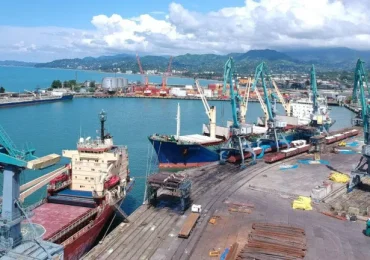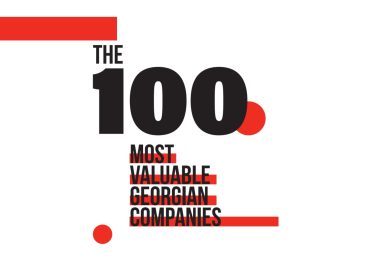Interview with Valeriya Ionan,
Deputy Minister for Eurointegration at the Ministry of Digital Transformation of Ukraine
Russia has waged an aggressive war against Ukraine and already killed several thousand Ukrainians. More than half of the victims are civilians who were bombed, or shot in the cars while trying to leave the war zone.
By doing so, Russia has started a war against its own economy – the national currency has collapsed by half, there is already a shortage of products in stores and the 30-day countdown to Russia’s default may begin any day now. After all, none of the investors will take seriously the Kremlin’s intentions to pay debts in rubles while the Central Bank’s reserves are frozen by Western sanctions.
The War Against The Russian Economy
Russia, having started the war against Ukraine, is plunging into an economic crisis, worse than it has been in the late 1990s. And it builds a new iron curtain between itself and the whole civilized world, paying a high price for the war. Already, more than 300 foreign companies have withdrawn their business from Russia or suspended investments in protest against the invasion of Ukraine.
Companies, curtailing their activities in Russia permanently or temporarily, care primarily about reputational risks – business does not want to be associated with a bloody regime. And then the sanctions imposed by the entire civilized world will work in full force. More sanctions have now been imposed on the Kremlin than on Iran and Syria have taken together. And these sanctions are not for a day or a month. They will not be cancelled even if Russia decides to withdraw its troops and return the occupied territories to Ukraine.
However, even this does not stop some foreign companies that still operate in Russia and refuse to close down their activities, allegedly with concern for ordinary Russians. Such a business should think: what’s next? The real income of Russians will fall more and more; the supply chains are already destroyed due to sanctions. So is it worth holding on to the opportunity to squeeze a few more rubles out of a dying economy? Especially rubles smeared with the blood of children and peaceful Ukrainians?
Why is it already reasonable to focus on Ukraine as a country for investment?
The war will end with the victory of Ukraine – it’s only a matter of time. After the war, the reconstruction of Ukraine will begin. Not just roads or bridges. From the ashes, we will have to rebuild entire cities, bring the economy back to life, establish new production chains, implement new services. Already, Western partners and allies are discussing their readiness to lend a hand to Ukraine in the great reconstruction. And this opens huge business opportunities.
Ukraine is one of the largest countries in Europe. The population is almost 40 million people and most of them (69%) live mainly in cities. Before the war, 5.5 million Ukrainians lived in Kyiv alone. The average salary in the Ukrainian capital as of January 2022 was $750. This is a huge market for new products and services that will appear in Ukraine.
Another important aspect is that Ukraine has now applied for membership in the European Union. And this is a powerful incentive to attract foreign investment. Even before the war, foreign direct investment in Ukraine had been growing steadily, amounting to about $23 billion over the past seven years. And after the end of the war, against the background of positive signals from the EU, investors will look at Ukraine with even greater interest. Recall the example of Croatia, which fought bloody wars for its independence in the mid-1990s, became a candidate for EU membership in 2004 and received a surge in foreign direct investment in a year or two.
Also, one should consider the vast digitalization of processes over the past few years, which minimizes bureaucratic procedures. And also people, who have shared European values and lifestyles for a long time – every third Ukrainian since the visa-free regime has visited European countries for vacations, work or study.
Now, Ukraine means prospective. Russia means stagnation and immersion in dark medieval times. Remaining in the Russian market means shared responsibility for the bloody war waged by Putin’s Russia.
What did you do during the war?
At this time, it is extremely important to understand that business as usual does not work. This is not 2014 when Russia found itself under some mild sanctions after the annexation of Crimea, and there could be attempts to circumvent these sanctions among some entrepreneurs. When the war is over, such a business will be questioned: what did you do? Did you pay taxes to the Russian budget, thus financing the war? Or did you stay alongside the whole world valuing human lives higher than money?
Due to the war waged by Russia, Ukraine is losing human lives and infrastructure which is destroyed by enemy artillery and air forces. The damage inflicted by the enemy already achieved hundreds of billions of dollars. Therefore, after the end of the war, Kyiv will have an absolute moral right to tell the business that remained in Russia to do the same thing that the Ukrainian Marines told the Russian ship to do.
It’s not an option to sign a check for several million dollars with one hand to help refugees and to pay taxes to the Russian budget with the other. It will not be possible to turn off the lights last in Moscow, and then appear with a briefcase and a proposal to develop business in Ukraine. You need to choose right now; you cannot just wait to see who wins.
Forbes Georgia: სარედაქციო გუნდი

















